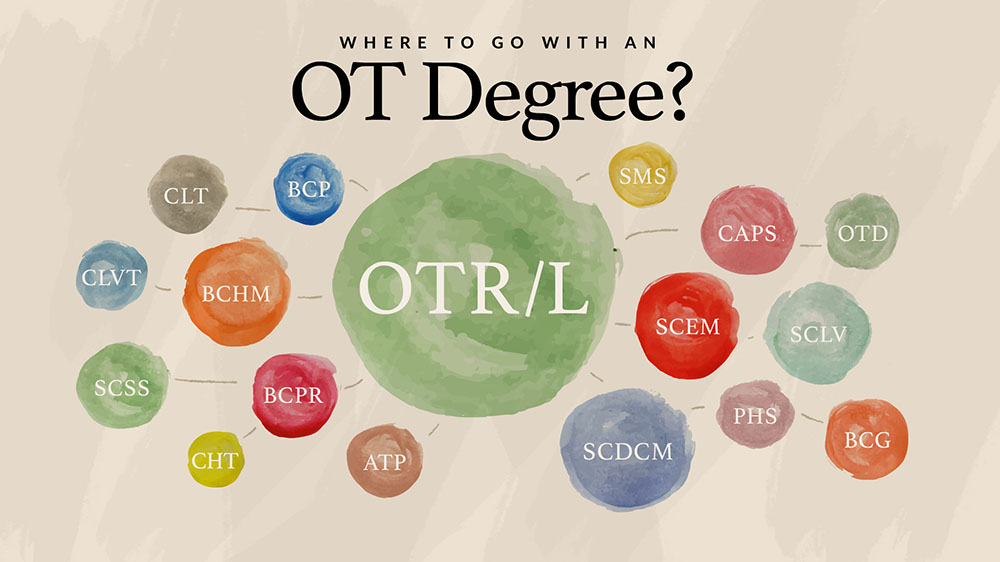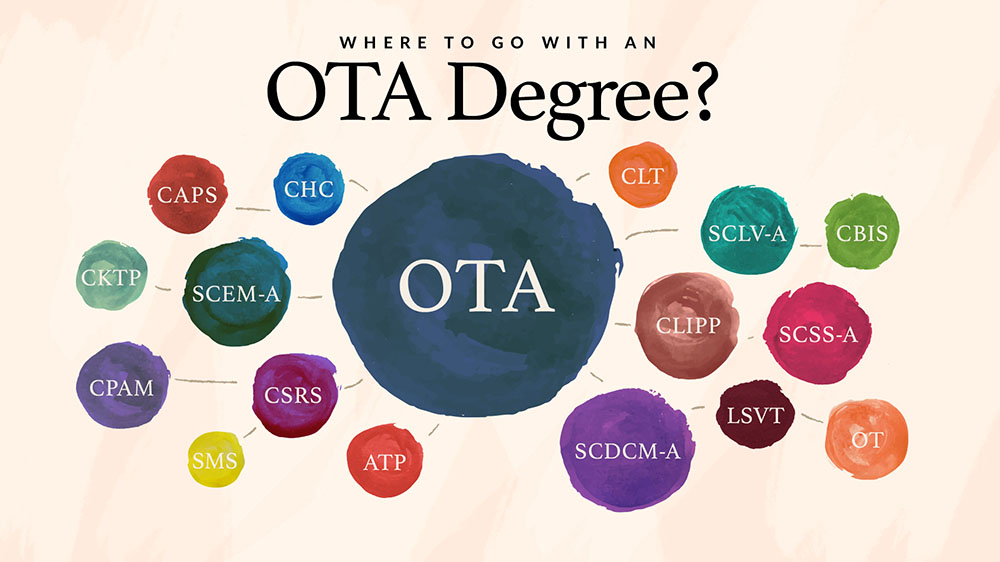
Once you’ve made the big decision to become an occupational therapist, you have many occupational therapy schooling options to build your dream career.
There are two degree levels that allow you to enter the field—and then multiple others you can pursue from there to build your expertise and skills!
It is vital that you take ample time to consider which entry-level degree pathway is right for YOU. You do not want to invest a tremendous amount of time and money heading down the wrong path.
So, in this post, we will introduce all the different OT-related degrees and pathways. We’ll begin with an overview of the entry-level degrees (MOT & OTD). Next, we’ll survey the terminal (PPOTD) and complementary degrees (PhD, EdD), and then close with some big-picture questions for you to consider as you embark on your OT education journey.
Here’s a quick outline of what we’ll cover:
- Entry-Level Occupational Therapy Degrees
- Terminal Occupational Therapy Degrees
- Other Common Terminal Degrees
- Other Complementary Degrees
- A Few More Good Questions to Consider
A Quick Note on “OTR/L”
When you see the credentials of an occupational therapist, you will often see OTR/L behind their name. This indicates that they not only have one of the OT degrees listed below, but also that they are registered with the National Board for Certification in Occupational Therapy (NBCOT) and that they are licensed by their state.
Registration with NBCOT is optional, so you could technically see an OT/L. But, obtaining a license at the state level is always required for practice.
Entry-Level Occupational Therapy Degrees
The first educational decision you will make is related to your “entry-level” degree. This is the initial degree you obtain in order to earn your license and practice as an occupational therapist.
It’s important to understand that up until 2007, occupational therapists in the United States could enter the field with a bachelor’s degree in occupational therapy. In fact, there are still many practicing clinicians with this degree today.
But if you are starting your journey today, you will need to first earn your bachelor’s degree (ideally in an area that allows your to fulfill your prerequisites) before continuing on to obtain either your:
- MSOT (master of science in OT)
- OTD (doctorate of OT)
While both of these degrees are entry-level degrees that allow you to practice as an occupational therapist, they are distinct programs. And, the decision to pursue one over the other should be weighed carefully.
If you decide to obtain an MSOT instead of an OTD, it does not necessarily mean you can’t earn your doctorate at some point in the future, but it is still a major decision with both short-term and long-term implications for your career.
Here’s what you need to know about choosing your entry-level degree:
MSOT (master of science in OT)
The MSOT or MOT degree takes approximately 2.5 years to complete. It includes about 2 years of coursework and 7 months of clinical rotations (these rotations are called “fieldwork”). You’ll have 1 month in Level 1 Fieldwork and 6 months in 2 different Level 2 Fieldwork placements.
The cost of obtaining a master’s degree varies depending on the school you choose, but overall, it is less expensive and less time-intensive than earning an OTD.
Once you graduate and pass the NBCOT licensing exam, you will typically use the credentials MOT, OTR/L. This allows you to treat, evaluate, and develop treatment plans and goals for your patients.
The vast majority of OT jobs in the US are open to both MSOT and OTD occupational therapists. And, your salary likely will not vary much based solely on your degree. So, if your goal is to practice in a traditional setting, an MSOT is probably your most economical choice.
Another perk of this degree is that it allows you to begin practicing more quickly, so you can dial in on your unique strengths and interests more quickly. Then, if you want to specialize later in your career, you could look into a specialty certification to advance your knowledge—and possibly open more job opportunities.
If you are interested in teaching, an MSOT degree will also allow you to teach at an OTA program—and potentially some OT programs. (See the question below: Is your goal to work in academia?)
OTD Degree (doctorate of OT)
The OTD degree takes approximately 3.5 years to complete. It includes the same initial coursework as the MSOT, but OTD students also complete about 1 semester of additional coursework and a final capstone experience (which takes 4 months).
The intent of this additional education is to provide extra training in education, research, and clinical leadership.
The cost is typically more than a master’s degree, as there is an additional year of training. After graduating and passing the NBCOT licensing exam, therapists with this degree typically use “Dr.” as their salutation and list their credentials as “OTD, OTR/L.”
The OTD degree sets you up to begin specializing and pursuing your unique interests early in your career. So, if you are interested in pursuing academia, leadership, or program development, the OTD degree is worth considering!
However, you should be aware that the OTD is still considered an entry-level degree. In line with education training requirements, OT graduate programs are required to have a portion of faculty members with terminal degrees in their field. For example, OT doctoral programs are required to have at least 50% of full-time core faculty with a post-professional doctorate (per ACOTE Standard A.2.7). So, while the OTD can open pathways for teaching, those seeking careers in academia may want to dig into these requirements, as they may still need to complete additional training to obtain a terminal degree.
As mentioned above, the OTD program culminates in a capstone experience. To gain a better understanding of the capstone, we encourage you to check out our podcast episode on Making the OTD Capstone Matter. You can also see examples of capstone experiences in our OT Capstone Catalog.
Terminal Occupational Therapy Degrees
Once you’ve obtained an entry-level degree, your OT learning journey does not have to end! There are several other degrees you can consider. The options below are considered terminal degrees, because they are the highest level of education you can obtain in their respective areas.
PPOTD (post-professional OTD)
Individuals who graduated with a bachelor’s or master’s degree in occupational therapy can pursue a post-professional OTD. The PPOTD is considered a terminal degree in the field.
A PPOTD can expand your teaching options and further establish your mastery in a particular area of practice. It can also equip you to grow in the areas of leadership, innovation, community practice, and/or advocacy.
Occupational therapists who complete the PPOTD degree typically add the credentials OTD to their name. (Honestly, this can be a little confusing, because the credentials look the same as those for the entry-level OTD.)
This degree is offered by a number of schools. Many PPOTD programs are online, and the duration is typically a couple of years with part-time effort. The cost varies by program. The curriculum content also varies significantly, as this degree is not standardized by ACOTE like entry-level degrees are. Many programs do include some type of capstone or final project.
Amanda Mack, OTD, MS, OTR/L, CLC, an associate professor at Washington University at St. Louis who recently completed a market analysis of PPOTD programs, shared with us some of her findings on the variation among programs.
She said most programs range from 1.5 years to 3 years part-time. This typically requires 5–6 semesters of coursework (including a summer semester). Some programs allow you to go right from your master’s degree program to a PPOTD program; others require 1 or more years of work as a practicing OT.
The cost of these programs varies widely. In Amanda’s analysis, the most expensive was around $70,000 and the cheapest was around $13,000. Private schools are generally more expensive than public institutions.
The program fees also vary widely, and we definitely recommend exploring them as you compare the total cost of different options. Most program fees fell somewhere between $25,000–$35,000 for the whole program.
More programs are moving toward 100% online (though some still require onsite visits), and there are a handful of in-person PPOTD programs out there. Amanda offered the helpful reminder that just because a program is online doesn’t mean that it requires less work. 🙂 Students should still expect to spend around 20 hours per week on coursework—even for part-time curriculum.
Finally, she highlighted the importance of understanding the focus and specialties of each program. Some are more generalist, while others are more clinically focused or leadership-specific. Some require residencies, and some don’t. Some feature all asynchronous learning, while others require a lot of synchronous time. Make sure you understand the model of the program and how it will fit into your lifestyle!
Other Common Terminal Degrees
Some OT professionals may seek other degrees that support their area of clinical practice, education, or research. There are many different types of degrees, but some of the more common ones pursued by OTs include:
PhD (doctor of philosophy)
The PhD degree typically takes 4–7 years to complete. It offers rigorous and specific training to become an independent scientist as the principal investigator (PI). In most PhD programs, you will be matched with an individual mentor who oversees your training during that time. Along with a written dissertation, a PhD program typically requires:
- some sort of preliminary exam once coursework is completed,
- a proposal presentation, and
- dissertation defense.
As with any degree, be sure to really dig into the costs and benefits of each program you are considering. Some full-time, research-oriented PhD programs cover education costs and/or offer a stipend or other student benefits.
Upon passing a dissertation defense, most graduates include the PhD credential behind their name.
If you think you may want to pursue a PhD, check out these next steps:
EdD (doctor of education)
The EdD degree is often completed by individuals looking to become professional educators.
The EdD degree can take around 3 years to complete. Here is a general guide to becoming a professor, and how the EdD opens advanced teaching opportunities.
To understand the specific requirements for teaching at each level in an OT program, look into the ACOTE (Accreditation Council for Occupational Therapy Education) Standards.
It may also be helpful to reach out to an OT who has obtained an EdD. If you don’t have one in your network, we recommend using the OT Near Me Directory to search for an OT with these credentials.
Watch the video below for a more detailed comparison of the OTD versus PhD versus EdD:
Other Complementary Degrees
Beyond the pathway of moving from an entry-level degree to a terminal degree, there is always the option to obtain a second master’s degree. OTs often go this route when they are drawn to a field that complements their OT work.
We’ll highlight one such degree below as well as list some other options.
MSCI (master of science in clinical investigation)
Some universities offer the MSCI as a way for those with doctorate degrees (e.g., OTD) to gain additional specific training in science and research. People who pursue this degree often are looking to build a career as a scientist or to lead independent research.
It may be possible to obtain funding that covers the cost of this degree—or to complete part of the degree during your capstone as an OTD student. It takes about 1 year to complete.
Similarly there is an DSc (doctorate of science) degree that some universities offer to clinical providers. (The University of Oklahoma has one with scholarships!) These programs offer additional training to those seeking to develop and test research questions.
Additional degrees in this vein include:
- Master of Public Health (MPH)
- Master of Business Administration (MBA) in Health Care
- Master of Health Administration (MHA)
A Few More Good Questions to Consider
We touched on some of these questions above, but they are so important that we wanted to highlight them again here.
1. Do you want to do research?
There are few different paths to getting involved in research.
Many OT professionals are a part research teams—often serving as research interventionists, evaluators, and coordinators. If you live near a university, check out their research in rehabilitation, OT, PT, psychology, and neuroscience! You may find an OT working there, or you can reach out to the Principle Investigator (a.k.a. PI, usually a faculty member) to ask if they have any openings available!
If you want to be asking and answering your own research questions, additional training is required. This can come in the form of an MSCI, ScD, or PhD, depending on the level and type of research you want to do. After completing a PhD, many people also complete postdoctoral training (often referred to as a “postdoc”) to learn a new aspect of research (the length of a postdoc varies, but it typically lasts 1–5 years).
If you are seeking government funding for your (e.g., via NIH), the PhD path is often recommended.
For more information about various paths to careers in research, check out this video:
To learn more about a day in the life of someone pursuing a research career, check out this video.
2. Is your goal to work in academia?
As you probably picked up above, there are avenues to academia at all degree levels. But there are also some possible limitations.
If working in academia is interesting to you, start having conversations and considering what level might be the best fit.
This is pretty nerdy, but it might even be worth looking at the ACOTE (Accreditation Council for Occupational Therapy Education) Standards to understand the required percentages of degree levels at each level of education.
For a more fun look into academia, I also recommend the Dr. thOTs podcast episode, “From Practitioner to Professor.”
3. Is your heart set on being a master clinician?
If your goals are focused on honing your craft, there are many ways to build on your entry-level OT degree. You can seek out mentoring, work at a research hospital, and/or obtain advanced certification.
Many OTs who become “master clinicians” end up pursing entrepreneurial endeavors like starting their own practice—or even teaching continuing education courses. These options do not include earning an advanced degree, but they certainly entail a lot of new learning in their own right.
4. Which degree will have the best return on investment for YOU?
We cannot talk about degrees without talking about the costs behind them. We highly recommend avoiding any decisions that cause you to unnecessarily accrue student debt. Take time to become fully informed about the costs and benefits of each degree. At the end of the day, only you can decide if a degree is worth it for YOU.
Conclusion
OT careers can take many paths. And, it is often hard to predict what your path will look like. But, I hope this post gives you solid information to reflect on when you come to critical decision points—like which entry-level degree is right for you.
No matter what path you end up taking, we are excited you are digging deeper into these questions. We need thoughtful OTs at all levels of practice! There certainly is no one “right” path to take.
If you have more questions, please don’t hesitate to reach out in the comments.



2 replies on “Which OT Degree? (MSOT, OTD, PPOTD, & More!)”
This is a very good information. Thanks for doing the research. I have learned a lot and it has given me some guidance to my next steps Thank you
For those interested in research and likely a PhD, would an OTD be recommended over an MOT?